Published Dec 12, 2011
Longtime Trek Producer Merri Howard Looks Back
Longtime Trek Producer Merri Howard Looks Back
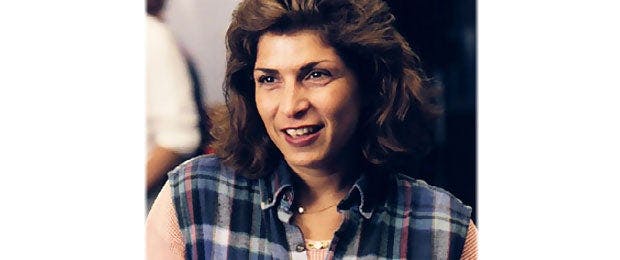
Merri D. Howard is one of those names that Star Trek fans glimpsed for years – and years and years – in the credits of The Next Generation, Voyagerand Enterprise. Depending on the year and the show, she was credited as first assistant director, unit production manager, line producer, supervising producer or producer. Howard rarely granted interviews during her Trek tenure, but we recently convinced her to look back on that time, and in the following Q&A she defines the responsibilities of each title she held, addresses the highs and lows of each show, and talks about what she’s working on now.
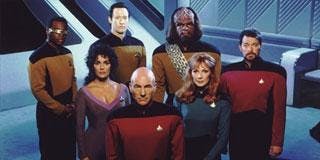
How did you first connect with TNG?
Howard: I was working at Paramount Studios as a first assistant director. One of the first assistant directors was not returning. I knew Rick Berman when he was a production executive at Paramount overseeing MacGyver, which I had worked on, as well as Sam Freedle, who was the unit production manager on TNG.. At that time, I wanted to find a home and work on a show that was stage-based versus location-based. I met with Sam, then interviewed with Rick and was offered the position as first assistant director.
At the start, what were your responsibilities?
Howard: I worked as a first assistant director, whose job it is to ensure that every shooting day comes in on schedule, while maintaining a working environment in which the director, actors, and crew can focus on their work. It was also my job to oversee day-to-day management of cast and crew scheduling.
What do you remember most about your time on TNG?
Howard: For me, it was a great working environment. We were given creative freedom and financial freedom, as long as we stayed within the guidelines the studio set for us and came in on budget. The cast was amazing to work with, and the crew were true professionals, talented and creative. Everyone was at the top of their game... allowing us to deliver amazing episodes and have fun at the same time.
Who was it who saw your work and how well you did it, and promoted you up the ladder?
Howard: I have been very fortunate to have many mentors through my career. I owe my success on Star Trek to Rick Berman first and foremost, who was always there to support me. I also had the backing from the studio. Jeri Taylor, Michael Piller and Brannon Braga were also huge supporters of mine through the years on Trek.
The TNG cast was known to be a tight unit. What were they like to be around on a daily basis?
Howard: Overall, the cast were all remarkable in their own way. We grew to be a family. We laughed and cried together. We went through a lot together: marriages, divorces, birth of children, deaths of crew members. It is a grind working 12-16 hours a day as an ensemble cast, five days a week and 22 to 26 episodes a season. I had a pretty tight relationship with the cast, and when there was an issue, I had an open-door policy to come talk to me, so we could figure out how to solve a problem before it got too big.
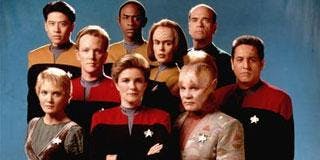
You later worked on Voyager. How different an experience was that?
Howard: Every show takes on its own personality, from writers to cast to crew. Everyone worked hard and was grateful to carry on the legacy.
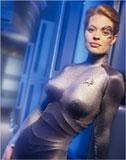
Jeri Ryan arrived to play Seven of Nine. Some fans liked the drama/friction/sexiness Seven added, while others thought she was a sex-bomb character designed to attract fanboys. What was your feeling about how Seven was integrated into the show? And what was it like on set, in terms of how this new actress affected things?
Howard: The decision to have a new character join the cast was decided upon by studio and executive producers to help boost audience viewership. Jeri was incredibly professional. She was gracious as she integrated into understanding set culture.
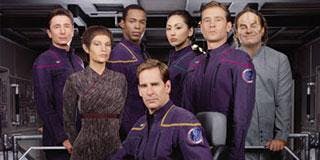
You next worked on Enterprise. How involved were you during the show’s development?
Howard: Once the script was written, then came the concepts of production design, followed by costume design. That’s when my involvement starts, when we start talking money and budgets.
What worked best on Enterprise?
Howard: We had an amazing staff, cast and crew. Scott Bakula set the bar high professionally. Again, we all felt blessed to be able to come to work every day and enjoy what we do.
The argument often made is that too many people were with Trek too long and that, despite all good intentions, they'd started to lose steam, started to repeat themselves when it came to stories, etc. Your thoughts?
Howard: I am not a writer, but I do know how hard it is to come up with new concepts -- especially when you are delivering 22 episodes a season -- and keep it fresh. I have to commend the writers for the work they did. It is not easy.
A lot of people also feel Enterprise was not given a fair shake, that it was underrated and people missed out on a good thing…
Howard: I agree that Enterprise ended too soon. The business model for television is ever-changing and the network/studio was the one to call the shots. I guess if I look back... it was great to have the years we did.
You jumped from first A.D. to unit production manager to line producer, supervising producer and producer. Can you briefly describe how one position varies from the other?
Howard: As a first A.D. I alternated episodes prepping and then shooting that episode, so I was responsible for breaking down and scheduling the episode. Then, once on stage, we would shoot either 7 or 8 days per episode... anywhere from 12-16 hrs. I then moved up to unit production manager when my immediate boss, Sam Freedle, became ill. The intention was to do the job until he could come back to work. Unfortunately, he was not able to and I moved into the position fulltime. I called it being thrown into the fire to see how I could dance. Being unit production manager involved the detailed planning and execution of below the line costs, which are physical production costs. I then was promoted to line producer, supervising producer and co-exec producer. My responsibilities broadened to executing the creative vision for the writers and director, but I also was involved in casting and publicity. I called it being the COO of the franchise, working for the studio and executive producers.
How long did you ultimately work on Trek, and what would you like to think were your biggest contributions to the franchise?
Howard: I worked on Trek for 17 years. I am very much a people person, (and tried to) bring my managerial skill set to each show to make the productions work effectively and efficiently. I went to work every day learning something new, and always went home every night trying to figure out how to make the next day better than the previous one.
What ran through your mind in terms of "What's next?" as Enterprise neared its end?
Howard: I knew that I wanted to continue in dramatic one-hour television, as I find it very challenging personally and professionally. I had to figure out how to get exposure for myself after being so insulated for so long. I hired a manager who guided me to meet other production executives and producers at other studios. I was hired to do a television pilot for Warner Bros. and Jerry Bruckheimer Television as I was finishing the last episodes of Enterprise.
How were Cold Case and The Whole Truth as experiences and what lessons had you learned on Trek that you brought to bear on them?
Howard: I continue to realize how important it is to listen to cast and crew and make yourself available at all times to discuss potential problems. I came onto Cold Case halfway through season 3 and had to earn the trust and respect of the cast and crew. Again, I have been so fortunate to work with great executive producers and studio executives on Cold Case and The Whole Truth. My motto is never say no, give options and work as a team and hopefully that brings great success.
What are you working on now?
Howard: I just finished working on a new Shonda Rhimes series for ABC called Scandal. We will find out in January when it airs. I am relaxing with my family for the month of December and will do a pilot in January.
Who are you still in touch with/still working with from your Trek days?
Howard: I have been very lucky to work with Brad Yacobian for the past 20 plus years. We have stayed together as a team and he has worked as a production manager with me. Louise Dorton and Gayliann Harvey have been working with me on Cold Case and The Whole Truth. Sarah Rissmiller, who started as a production assistant on Star Trek, has been working as my right arm and assistant for the last several years. I keep in touch with Dave Rossi, Eric Norman and Maril Davis, who were all my assistants at one time. Dave Rossi and I just saw Marina Sirtis in a play today called A Snow White Christmas. I see Robbie McNeill and Dawson, both of whom are directing. When I was at Warner Bros., I saw Peter Lauriston, Dan Curry and David Trotti. They are working on the Warner Bros. lot on various shows. I have been in contact with the TNG cast, as well as the Voyager cast. I just had dinner with Rick Berman and his wife, bumped into Manny Coto, and I speak to Bill Peets often. I do e-mail and get e-mails from various other crew members frequently. Unfortunately, it is hard to keep up socially, as when I am working my hours are long and my spare time is spent with my husband and daughter.
Click HERE to follow Merri D. Howard on Twitter.
